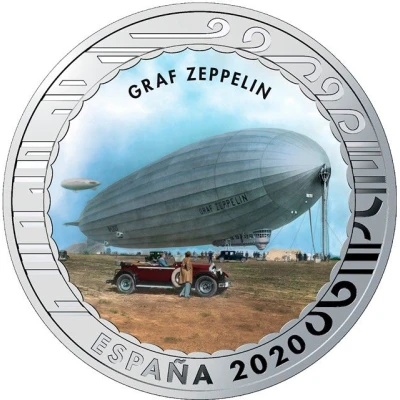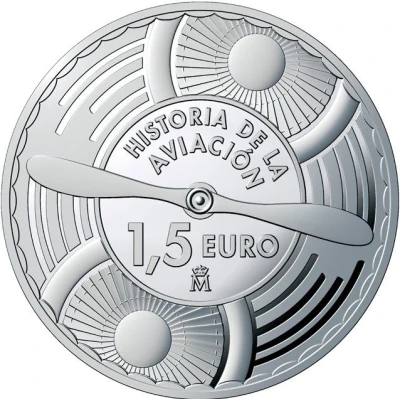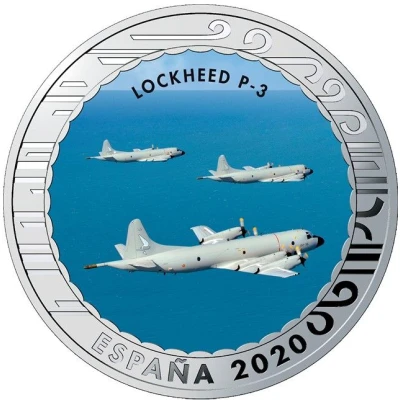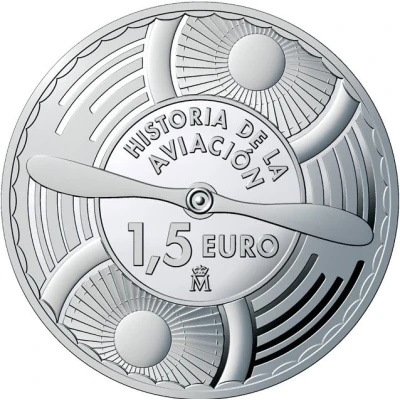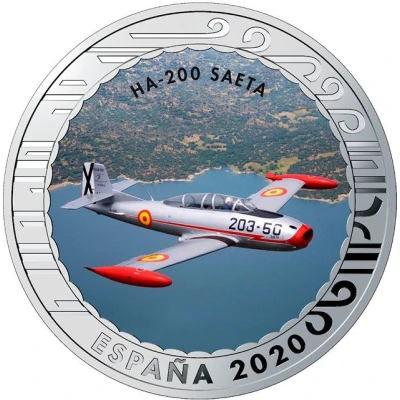
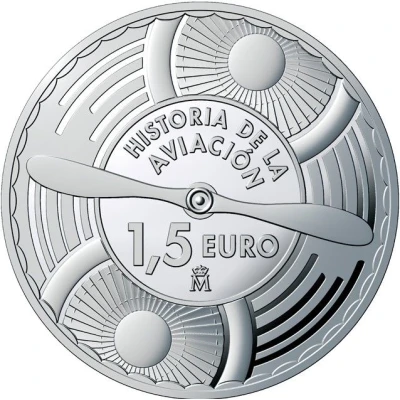

© Real Casa de la Moneda
1.5 Euro HA-200 Saeta
2020 year| Copper-nickel | 15 g | 33 mm |
| Issuer | Spain |
|---|---|
| King | Felipe VI (2014-date) |
| Type | Non-circulating coin |
| Year | 2020 |
| Value | 1.5 Euro 1.50 EUR = USD 1.65 |
| Currency | Euro (2002-date) |
| Composition | Copper-nickel |
| Weight | 15 g |
| Diameter | 33 mm |
| Shape | Round |
| Technique | Milled, Coloured |
| Orientation | Medal alignment ↑↑ |
| Updated | 2024-10-07 |
| Numista | N#272342 |
|---|---|
| Rarity index | 90% |
Reverse
Two-bladed propeller in central circle, in outer ring two turbines separated from each other by lines.
Script: Latin
Lettering:
HISTORIA DE LA AVIACIÓN
1,5 EURO
M
Translation: History of aviation
Edge
Plain
Comment
The first aircraft with jet propulsion to be built in Spain by the Seville company Hispano Aviación. It was also the first Spanish plane with pressurized cabin and the first Spanish plane to be exported to Egypt, which built it under licence. Designed in the 1950s by the legendary German engineer Willy Messermitch, this advanced training and ground attack two-seater subsonic jet aircraft, this two-seater subsonic jet aircraft conducted its maiden flight in August 1955. A total of 120 planes were built in Spain and 90 in Egypt, plus two prototypes.It was in service for 19 years (1962-1981). The legal limitations imposed on the German designer after World War II prevented him from developing a project with a more powerful aircraft engine and he had to settle for adopting the Turboméca Marboré engine with 400-Kg thrust fitted in the French Fouga “Magister” training plane. However, the “Saeta” was one of the most modern advanced training aircraft of its time.
With Egypt it took part in the 1967 Arab-Israeli conflict and later, in the 1970s, the “Saetas” with their base in Gando (Gran Canaria) would play an important role in the Spanish Sahara conflict where, for political reasons, Spain was unable to use the modern US F-86 “Sabre” material. From the Gando airbase, the home of 462 Squadron, reconnaissance and ground-attack missions were undertaken with great precision.
The single-seater, tactical-support HA-220 “Super Saeta” version, was produced from 1971 to 1977, with two variants, HA 220 E (C.10B), which had Oerlikon air-surface under-wing rocket launchers, and the photographic reconnaissance HA 220 (AR.10 C). The back seat of the HA 220 “Super Saeta” was used for housing a self-sealing fuel tank.
Interesting fact
The HA-200 Saeta coin from Spain features a unique design that showcases a sailboat gliding across the water, with the wind in its sails. The coin's design is meant to symbolize the country's rich maritime history and its connection to the sea.
Price
| Date | Mintage | VG | F | VF | XF | AU | UNC |
|---|---|---|---|---|---|---|---|
| 2020 M | 7500 | - | - | - | - | - | - |
Values in the table are based on evaluations by sales realized on Internet platforms. They serve as an indication only for 1.5 Euro (HA-200 Saeta) 2020 coin.
